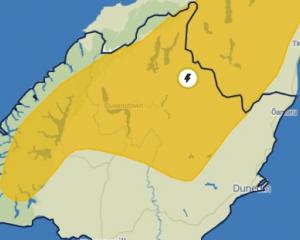Pre-Covid-19, Essie Steven from Tarras sold her ceramic coffee mugs without handles, because overseas tourists feared handles would break off in their suitcases.
Pre Covid-19, Judi Barton sold all the woollen blankets she could knit at the Queenstown market.
And, pre Covid-19, Simon Rasmussen and Kat Harper focused on New Zealand landscapes for their 3-D tourist pictures.

Now, Essie has added a handle for the New Zealand market, Judi is selling online for the first time and Simon and Kat have diverted into pictures for children.
Riverton manufacturer Bruce Shields, however, has yet to find a way to adapt paua shell products to the new normal.
He faces the prospect of making redundant some of the 20 people who make the paua shell brooches, cufflinks, hair clips, necklaces and key rings overseas tourists expect to find in the 120 New Zealand shops he supplies.
"We’re almost at zero with most of our manufactured product which sells in New Zealand."
Mr Shields’ business, Ocean Shell Studios, also has about 80% to 90% of the market in raw paua shell and exports 200 tonnes a year, mainly to Asian factories that supply the United States and Europe.

"We have pre-Covid orders we are still filling and people haven’t pulled out of them.
"But there is nowhere near the level of inquiry we had before Covid."
Mr Shields also handles the shipping of mother of pearl shell from the Pacific Islands, which is turned into buttons in factories in Asia.
"Those factories are all in big trouble.
"The pipeline is chocker full of shell and product."
Mr Shields is pinning some of his hopes on Australian tourists returning to New Zealand with their usual $3billion of holiday spending money.
But prospects of an early return seem unlikely.
"As long as the border’s shut, we are in trouble."
Mr Shields is left with the problem of how to sell paua shell products to New Zealand tourists.
There is no apparent, easy answer.
Essie Steven was one of just three traders at Wanaka’s market on a recent Thursday.
Her turnover has changed "drastically".
"It was building all summer; my first full summer.
"Then it stopped."
Her attention is now focused on attracting locals in a street mostly empty of overseas tourists.
Her first rule: "Don’t write New Zealand on anything."

Her ceramic cups, mugs and shot glasses retain their New Zealand landscapes — showing they are "of here" but not " in your face".
She hopes the special orders she is getting and "home mugs", rather than New Zealand souvenir mugs, will see her through.
Ms Steven said she is getting the Government subsidy.
"I definitely fit all the criteria on that one, unfortunately.
"I wish I didn’t, but that’s just how it is."
Judi Barton knits chunky merino wool blankets, something ideal for the southern winter but rarely bought by those who live south of the Waitaki River.
That did not matter before, because she could not keep up with demand from international tourists at the Queenstown market.
"I would fill my little car up, packed to the gunwales, and come home empty."
When the virus first struck Queenstown, at the peak of her selling season in March, the word quickly spread around market stallholders and she stopped attending.
"I went from hero to zero — nothing.
"I had no income, although I had superannuation, of course."
Initially, it was an "enforced holiday".
"Instead of knitting for eight hours a day, I would maybe do a few hours every couple of days."

But as it became clear there would be no early opening of the borders, she swerved to a place she had not been before — the internet.
"People talked me into going online."
And now she’s back where she was before — unable to keep up with demand — but supplying a different market.
"It’s to New Zealanders, believe it or not.
"I honestly believe it’s people doing what Jacinda is asking, and buying New Zealand.
"And I am selling to the South."
Simon Rasmussen and Kat Harper of Luggate launched their souvenir business just a year ago.
They wanted to create a plastic-free product and settled on laser-cut 3-D landscape pictures of New Zealand scenes, made from bamboo.
"I think back then, you would be crazy to think tourism was ever going to stop," Mr Rasmussen said.
They were supplying shops in the Lakes District, expanding further afield and Mr Rasmussen was about to give up his tiling business.
Then the virus struck.
"It was definitely a bit of a shock.
"It all crumbled underneath me."
A rethink led to a new line of pictures illustrating nursery rhymes.
"It’s actually been quite a good family time, a good time to relook at our business, and change direction and just be flexible with what we are doing."
They plan to show their wares to the retail industry at a trade show in Auckland in August.
"It’s amazing ... where ideas come from and where you end up going," Mr Rasmussen said.
"So that’s part of the journey, really.
"You’ve just got to keep changing and evolving."












